formerly eScholarship Editions


|
|
|
|
Your search for
'Classical Literature and Language' in subject
and
Public
in rights
found 15 book(s). | Modify Search | Displaying 1 - 15 of 15 book(s) | |
| 1. | 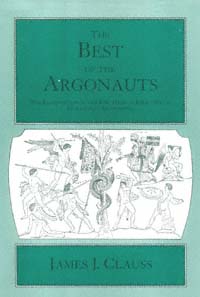 | Title: The best of the Argonauts: the redefinition of the epic hero in book one of Apollonius's Argonautica Author: Clauss, James Joseph Published: University of California Press, 1993 Subjects: Classics | Literature | Classical Literature and Language | Literary Theory and Criticism Publisher's Description: This revelatory exploration of Book One of the Argonautica rescues Jason from his status as the ineffectual hero of Apollonius' epic poem. James J. Clauss argues that by posing the question, "Who is the best of the Argonauts?" Apollonius redefines the epic hero and creates, in Jason, a man more realistic and less awesome than his Homeric predecessors, one who is vulnerable, dependent on the help of others, even morally questionable, yet ultimately successful.In bringing Apollonius' "curious and demanding poem" to life, Clauss illuminates two features of the poet's narrative style: his ubiquitous allusions to the poetry of others, especially Homer, and the carefully balanced structural organization of his episodes. The poet's subtextual interplay is explored, as is his propensity for underscoring the manipulation of the poetry of others through ring composition. [brief] Similar Items |
| 2. | 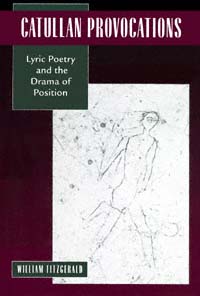 | Title: Catullan provocations: lyric poetry and the drama of position Author: Fitzgerald, William 1952- Published: University of California Press, 1996 Subjects: Classics | Comparative Literature | Classical Literature and Language | Poetry Publisher's Description: Restoring to Catullus a provocative power that familiarity has tended to dim, this book argues that Catullus challenges us to think about the nature of lyric in new ways. Fitzgerald shows how Catullus's poetry reflects the conditions of its own consumption as it explores the terms and possibilities of the poet's license. Reading the poetry in relation to the drama of position played out between poet, poem, and reader, the author produces a fresh interpretation of almost all of Catullus's oeuvre. Running through the book is an analysis of the ideological stakes behind the construction of the author Catullus in twentieth-century scholarship and of the agenda governing the interpreter's position in relation to Catullus. [brief] Similar Items |
| 3. | 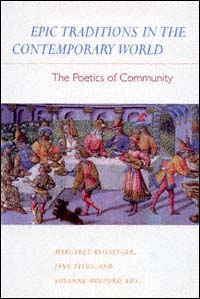 | Title: Epic traditions in the contemporary world: the poetics of community Author: Beissinger, Margaret H Published: University of California Press, 1999 Subjects: Literature | Classics | Classical Literature and Language | Comparative Literature Publisher's Description: The epic tradition has been part of many different cultures throughout human history. This noteworthy collection of essays provides a comparative reassessment of epic and its role in the ancient, medieval, and modern worlds, as it explores the variety of contemporary approaches to the epic genre. Employing theoretical perspectives drawn from anthropology, literary studies, and gender studies, the authors examine familiar and less well known oral and literary traditions - ancient Greek and Latin, Arabic, South Slavic, Indian, Native American, Italian, English, and Caribbean - demonstrating the continuing vitality of the epic tradition.Juxtaposing work on the traditional canon of western epics with scholarship on contemporary epics from various parts of the world, these essays cross the divide between oral and literary forms that has long marked the approach to the genre. With its focus on the links among narrative, politics, and performance, the collection creates a new dialogue illustrating the sociopolitical significance of the epic tradition. Taken together, the essays raise compelling new issues for the study of epic, as they examine concerns such as national identity, gender, pedagogy, and the creation of the canon. [brief] Similar Items |
| 4. | 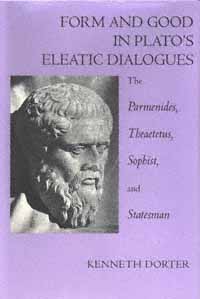 | Title: Form and good in Plato's Eleatic dialogues: the Parmenides, Theaetetus, Sophist, and Statesman Author: Dorter, Kenneth 1940- Published: University of California Press, 1994 Subjects: Classics | Philosophy | Classical Literature and Language Publisher's Description: In this innovative analysis, Plato's four eleatic dialogues are treated as a continuous argument. In Kenneth Dorter's view, Plato reconsiders the theory of forms propounded in his earlier dialogues and through an examination of the theory's limitations reaffirms and proves it essential. Contradicted are both those philosophers who argue that Plato espoused his theory of forms uncritically and those who argue that Plato in some sense rejected the theory and moved toward the categorical analysis developed byAristotle. Dorter's reexamination of Plato's insights implies an important new direction for modern philosophical inquiry. [brief] Similar Items |
| 5. | 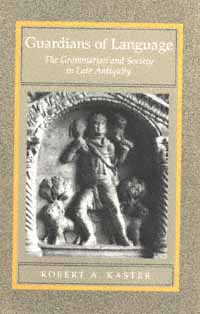 | Title: Guardians of language: the grammarian and society in late antiquity Author: Kaster, Robert A Published: University of California Press, 1997 Subjects: Classics | Classical Literature and Language | Language and Linguistics | Ancient History Publisher's Description: What did it mean to be a professional teacher in the prestigious "liberal schools" - the schools of grammar and rhetoric - in late antiquity? How can we account for the abiding prestige of these schools, which remained substantially unchanged in their methods and standing despite the political and religious changes that had taken place around them?The grammarian was a pivotal figure in the lives of the educated upper classes of late antiquity. Introducing his students to correct language and to the literature esteemed by long tradition, he began the education that confirmed his students' standing in a narrowly defined elite. His profession thus contributed to the social as well as cultural continuity of the Empire. The grammarian received honor - and criticism; the profession gave the grammarian a firm sense of cultural authority but also placed him in a position of genteel subordination within the elite.Robert A. Kaster provides the first thorough study of the place and function of these important but ambiguous figures. He also gives a detailed prosopography of the grammarians, and of the other "teachers of letters" below the level of rhetoric, from the middle of the third through the middle of the sixth century, which will provide a valuable research tool for other students of late-antique education. [brief] Similar Items |
| 6. | 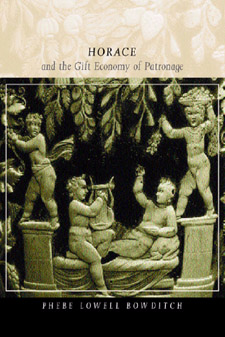 | Title: Horace and the gift economy of patronage Author: Bowditch, Phebe Lowell 1961- Published: University of California Press, 2001 Subjects: Classics | Classical Literature and Language | Poetry | Cultural Anthropology Publisher's Description: This innovative study explores selected odes and epistles by the late-first-century poet Horace in light of modern anthropological and literary theory. Phebe Lowell Bowditch looks in particular at how the relationship between Horace and his patron Maecenas is reflected in these poems' themes and rhetorical figures. Using anthropological studies on gift exchange, she uncovers an implicit economic dynamic in these poems and skillfully challenges standard views on literary patronage in this period. Horace and the Gift Economy of Patronage provides a striking new understanding of Horace's poems and the Roman system of patronage, and also demonstrates the relevance of New Historicist and Marxist critical paradigms for Roman studies. In addition to incorporating anthropological and sociological perspectives, Bowditch's theoretical approach makes use of concepts drawn from linguistics, deconstruction, and the work of Michel Foucault. She weaves together these ideas in an original approach to Horace's use of golden age imagery, his language concerning public gifts or munera, his metaphors of sacrifice, and the rhetoric of class and status found in these poems. Horace and the Gift Economy of Patronage represents an original approach to central issues and questions in the study of Latin literature, and sheds new light on our understanding of Roman society in general. [brief] Similar Items |
| 7. | 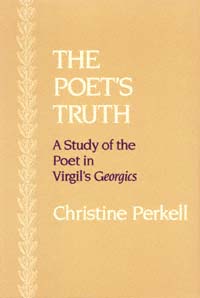 | Title: The poet's truth: a study of the poet in Virgil's Georgics Author: Perkell, Christine Published: University of California Press, 1989 Subjects: Classics | Classical Literature and Language Publisher's Description: The controversy over Virgil's optimism or pessimism, which has long absorbed readers of his poetry, might fruitfully yield to a perspective which allows contradictions to stand unresolved, to constitute, in fact, the essence of his poems' meaning. So interpreted, the pervasive contradictions of the Georgics are not problems to be solved, but expressions of the poet's vision of fundamental tensions in human experience.Focusing on the figure of the poet in his relationship to the farmer, Professor Perkell studies oppositions between power and beauty, profit and art, matter and spirit, which are critical to the poem's meaning. She points to the poet's privileging of myth over praeceptum , of divine revelation over experiment and practice, and of mystery over solution. The poem's oppositions find ultimate expression in the bougonia , literally false as Georgic precept but metaphorically true as image of Iron Age technology and culture. Through this metaphor, the poet suggests the high value of his own truth and implicitly challenges the values of the agricultural, material poem which the Georgics on its surface professes to be.Shaped by insights of reader-response and structuralist criticism, this new study of the Georgics should interest Classicists and students of literature. [brief] Similar Items |
| 8. | 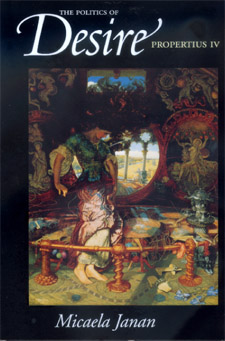 | Title: The politics of desire: Propertius IV Author: Janan, Micaela Wakil Published: University of California Press, 2000 Subjects: Classics | Classical Literature and Language | Poetry Publisher's Description: Propertius (ca. 54 b.c.--ca. 2 b.c.) was a Roman poet who composed four compelling books of elegies in the chaotic years surrounding Rome's transition from republic to empire. The first three of these books revolve mostly around a tormented love affair with a woman called Cynthia. The fourth book of poetry rests on more diverse subject matter and is notoriously the most opaque and elusive. In The Politics of Desire, Micaela Janan radically reassesses Propertius' last elegies, using contemporary psychoanalytic theory to illuminate these challenging texts. Janan finds that the upheaval of Rome's transformation to empire corresponds to the intellectually unsettled conditions of our own time, so that contemporary methodologies offer an uncannily suitable approach for understanding Propertius. In particular, she uses the work of Jacques Lacan, since it provides the best conceptual tools for examining the relation between political crisis and the struggles of the self, a theme that resonates in these difficult elegies. This book expands our understanding of an important Roman poet, and its innovative and sophisticated methodological approach makes a substantial contribution to feminist and psychoanalytic criticism. In addition, Janan addresses elegy's relationship to larger cultural questions, and broadens our understanding of the social crisis affecting Rome during the early empire. [brief] Similar Items |
| 9. | 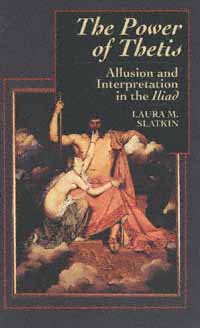 | Title: The power of Thetis: allusion and interpretation in the Iliad Author: Slatkin, Laura M Published: University of California Press, 1992 Subjects: Classics | Classical Literature and Language | Classics Publisher's Description: In The Power of Thetis, Laura M. Slatkin reveals the full importance of mythic allusion in Homeric composition and in the experience of Homer's audience. Similar Items |
| 10. | 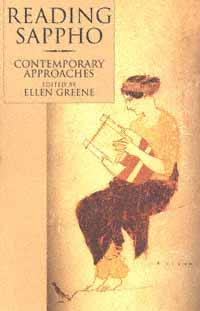 | Title: Reading Sappho: contemporary approaches Author: Greene, Ellen 1950- Published: University of California Press, 1998 Subjects: Classics | Classical Literature and Language | Literary Theory and Criticism | Poetry Publisher's Description: Reading Sappho considers Sappho's poetry as a powerful, influential voice in the Western cultural tradition. Essays are divided into four sections: "Language and Literary Context," "Homer and Oral Tradition", "Ritual and Social Context", and "Women's Erotics". Contributors focus on literary history, mythic traditions, cultural studies, performance studies, recent work in feminist theory, and more.A legendary literary figure, Sappho has attracted readers, critics, and biographers ever since she composed poems on the island of Lesbos at the close of the seventh century B.C. Bringing together some of the best recent criticism on the subject, this volume, together with Re-Reading Sappho , represents the first anthology of Sappho scholarship, drawing attention to Sappho's importance as a poet and reflecting the diversity of critical approaches in classical and literary scholarship during the last several decades. [brief] Similar Items |
| 11. | 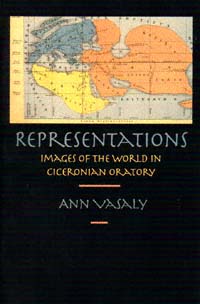 | Title: Representations: images of the world in Ciceronian oratory Author: Vasaly, Ann Published: University of California Press, 1993 Subjects: Classics | Literature | Politics | History | Literary Theory and Criticism | Classical Literature and Language Publisher's Description: Ann Vasaly introduces representation theory into the study of Ciceronian persuasion and contends that an understanding of milieu - social, political, topographical - is crucial to understanding Ciceronian oratory. As a genre uniquely dependent on an immediate interaction between author and audience, ancient oratory becomes performance art.Vasaly investigates the way Cicero represented the contemporary physical world - places, topography, and monuments, both those seen and those merely mentioned - to his listeners and demonstrates how he used these representations to persuade. Her exceptionally well-written study deftly recaptures the immediacy of Cicero's oratory and makes a trenchant contribution to an important new area of inquiry in Classical Studies. [brief] Similar Items |
| 12. | 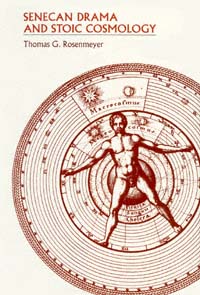 | Title: Senecan drama and stoic cosmology Author: Rosenmeyer, Thomas G Published: University of California Press, 1989 Subjects: Classics | Classical Literature and Language | Classical Philosophy | Theatre Publisher's Description: Lucius Annaeus Seneca, Nero's tutor and advisor, wrote philosophical essays, some of them in the form of letters, and dramas on Greek mythological topics, which since the early Renaissance have exercised a powerful influence on the European theater. Because in his essays Seneca, in his own eclectic way, subscribes to the philosophy of the Stoic school, scholars and critics have long been asking the question whether the plays, also, could be regarded as transmitters of Stoic thought. Various answers, ranging from a categorical no to an uneasy yes, have been given.With few exceptions, the students who have concerned themselves with this question have looked for their enlightenment in Stoic psychology and Stoic ethics. In this book, Thomas G. Rosenmeyer proposes instead to look at the Stoic science of nature, of the world and human beings in the world, as a more plausible grounding for the difference between Senecan drama and its Greek predecessors. In the process of looking at what the Stoics, especially the early Stoics, had to say about the forces determining natural phenomena, the author uncovers a deeply pessimistic strain in Stoic cosmology, and an interest in physicality and environmental tension, that he finds replicated in the theater, not only of Seneca, but also of the later European tradition indebted to him. [brief] Similar Items |
| 13. | 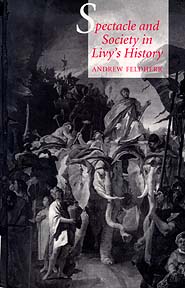 | Title: Spectacle and society in Livy's history Author: Feldherr, Andrew 1963- Published: University of California Press, 1998 Subjects: Classics | Classical Literature and Language | Classical History | Comparative Literature | Literature Publisher's Description: Public spectacle - from the morning rituals of the Roman noble to triumphs and the shows of the Arena - formed a crucial component of the language of power in ancient Rome. The historian Livy (c. 60 B.C.E.-17 C.E.), who provides our fullest description of Rome's early history, presents his account of the growth of the Roman state itself as something to be seen - a visual monument and public spectacle. Through analysis of several episodes in Livy's History , Andrew Feldherr demonstrates the ways in which Livy uses specific visual imagery to make the reader not only an observer of certain key events in Roman history but also a participant in those events. This innovative study incorporates recent literary and cultural theory with detailed historical analysis to put an ancient text into dialogue with contemporary discussions of visual culture.In Spectacle and Society in Livy's History , Feldherr shows how Livy uses the literary representation of spectacles from the Roman past to construct a new sense of civic identity among his readers. He offers a new way of understanding how Livy's technique addressed the political and cultural needs of Roman citizens in Livy's day. In addition to renewing our understanding of Livy through modern scholarship, Feldherr provides a new assessment of the historian's aims and methods by asking what it means for the historian to make readers spectators of history. [brief] Similar Items |
| 14. | 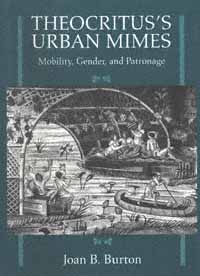 | Title: Theocritus's urban mimes: mobility, gender, and patronage Author: Burton, Joan B 1951- Published: University of California Press, 1995 Subjects: Classics | Classical Literature and Language | Women's Studies Publisher's Description: Drawing on current literary, cultural, and historical approaches, Joan Burton presents sophisticated new readings of Theocritus's urban mimes, which are among the most frequently cited evidence of Hellenistic cultural life, religion, magic, and aesthetics. Unlike Theocritus's bucolic poems, which focus on the male experience, all of his urban mimes represent women in more central and powerful roles, reflecting the growing visibility of Greek women at the time. A work of both innovation and wide-ranging scholarship, this book will be welcomed not only by students of the Hellenistic age but also by readers interested in issues of gender, sexuality, and culture in the ancient world. [brief] Similar Items |
| 15. | 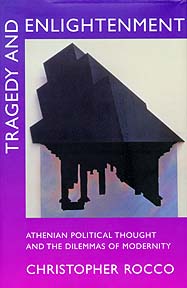 | Title: Tragedy and enlightenment: Athenian political thought, and the dilemmas of modernity Author: Rocco, Christopher 1958- Published: University of California Press, 1997 Subjects: Classics | Classical Philosophy | Classical History | Classical Literature and Language | Social and Political Thought | Social Theory Publisher's Description: Weaving together ancient Greek texts and postmodernist theory, Christopher Rocco addresses the debate between modernity and postmodernity that dominates contemporary theory. Interpreting Greek drama within a critical framework informed by contemporary theorists Foucault, Habermas, Horkheimer and Adorno, Tragedy and Enlightenment makes a sophisticated argument for the continuing relevance of the classical past, focusing on the subject of democracy.The starting point for Rocco's analysis is the impasse in contemporary political and cultural theory over the possibility and desirability of democracy in a postmodern world. After explaining the competing positions in the current debate, Rocco argues that ancient Greek tragedy and dialogue - specifically Sophocles' Oedipus , Plato's Republic and Gorgias , and Aeschylus' Oresteia - suggest alternate constructions for this and other postmodern problems.Rocco gives a detailed analysis of the contemporary divide over the theories of Jürgen Habermas and Michel Foucault and provides a provocative reading of Horkheimer and Adorno's Dialectic of Enlightenment. This original contribution to political and cultural discourse brings us to a new understanding of familiar texts and will alter the grounds of debate for students and scholars of the classical and the contemporary worlds. [brief] Similar Items |